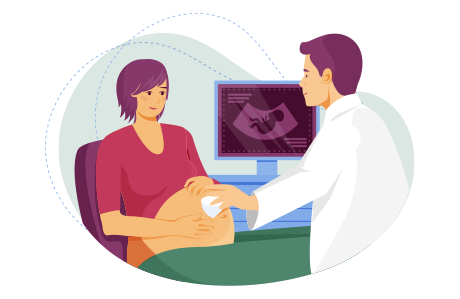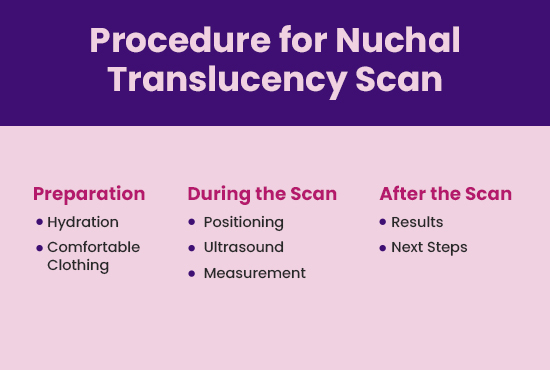
Nuchal Translucency Scan
Pregnancy is a journey filled with excitement, anticipation, and numerous important decisions. One critical step during the first trimester is undergoing various screenings and tests to ensure the health and well-being of both the mother and the developing baby. Among these, the Nuchal Translucency (NT) Scan plays an important role. In this blog, we will explore what the NT scan is, why and when it is done, and what to expect during the procedure.Understanding the Nuchal Translucency Scan
The primary purpose of a nuchal translucency scan in pregnancy is to screen for potential chromosomal abnormalities. Here is why the nuchal scan in pregnancy is important:
Early Detection: The NT scan helps detect the likelihood of chromosomal abnormalities early in the pregnancy, allowing for timely interventions and decisions.
Why it is Done: This scan measures the clear (translucent) space in the tissue at the back of the baby’s neck. The measurement helps assess the risk of chromosomal abnormalities, such as Down syndrome (trisomy 21), Edwards syndrome (trisomy 18), and Patau syndrome (trisomy 13).
When it is Done: A Nuchal Translucency (NT) Scan is a specialized ultrasound performed during the first trimester of pregnancy, typically between the 11th and 14th weeks.
Combined Screening: When combined with a blood test (first trimester screening), the NT scan provides more accurate risk assessments.
Peace of Mind: For many parents, the NT scan offers reassurance about their baby’s development and health.
Who Needs the NT Scan?
The NT scan is recommended for all pregnant women as part of routine first trimester screening. But, it is especially important for:
Women Over 35: Women who are 35 years or older have a higher risk of having a baby with chromosomal abnormalities. The NT scan helps in early detection and informed decision-making.
Family History of Chromosomal abnormalities: If you have a family history of genetic conditions or chromosomal abnormalities, the NT scan can provide essential insights into your baby’s health.
Previous Pregnancy with Chromosomal Abnormalities: Women who have had a previous pregnancy affected by chromosomal abnormalities should consider the NT scan to assess the risk in the current pregnancy.
Abnormal Results from Other Tests: If previous tests or screenings have shown abnormal results, the NT scan can provide additional information and help in further assessment.
Procedure for Nuchal Translucency Scan

Understanding what to expect during the NT scan can help ease any anxiety and prepare you for the procedure. Here is a step-by-step guide to understand the procedure for nuchal translucency scan:
Preparation
Hydration: You may be advised to drink some water before the scan and not to empty your bladder immediately before the scan. This is to ensure that some fluid is in the bladder, which can help improve the clarity of the ultrasound images.
Comfortable Clothing: Wear comfortable clothing that allows easy access to your abdomen.
During the Scan
Positioning: You will lie on an examination table, and a clear gel will be applied to your abdomen. This gel helps the ultrasound transducer move smoothly and transmit sound waves.
Ultrasound: The technician will use the transducer to capture images of your baby. The scan usually takes about 20-30 minutes.
Measurement: The doctor will measure the thickness of the nuchal translucency. A thicker measurement can indicate a higher risk of chromosomal abnormalities.
After the Scan
Results: The measurements taken during the scan will be combined with your age and the results of the blood test (if applicable) to calculate the risk of chromosomal abnormalities. Your healthcare provider will discuss the results with you and explain what they mean.
Next Steps: Based on the results, your healthcare provider may recommend further testing or screenings, non-invasive prenatal testing (NIPT), or diagnostic tests like amniocentesis.
Why Choose Garbh for Your NT Scan?
A Nuchal Translucency Scan is a vital screening tool during the first trimester of pregnancy. It helps assess the risk of chromosomal abnormalities and provides valuable information about your baby’s development. At Garbh, we are committed to providing the best diagnostic services, support, and care to ensure a healthy and happy pregnancy journey. If you are looking for a reliable and experienced diagnostic center for your NT scan in pregnancy, choose The Garbh. Our dedicated team is here to support you with expert care and personalized services. Contact us today at +91 7087204818 to schedule your NT scan and take the first step towards a healthy pregnancy.
FAQs
What is an NT scan in pregnancy?
Ans. An NT scan in pregnancy is a specialized ultrasound performed between the 11th and 14th weeks to measure the translucent space at the back of the baby’s neck. This helps assess the risk of chromosomal abnormalities.
Why is the NT scan important?
Ans. The NT scan helps detect the likelihood of chromosomal abnormalities early in pregnancy, allowing for timely interventions and informed decisions.
How do I prepare for an NT scan?
Ans. No special preparation is required. You may be advised to drink some water before the scan and not to empty your bladder immediately before the scan. This is to ensure that some fluid is in the bladder, which can help improve the clarity of the ultrasound images. Wear comfortable clothing for easy access to your abdomen.
What happens after the NT scan?
Ans. After the scan, the measurements are combined with your age and blood test results (if applicable) to calculate the risk of chromosomal abnormalities. Your healthcare provider will discuss the results and recommend any further testing if needed.

